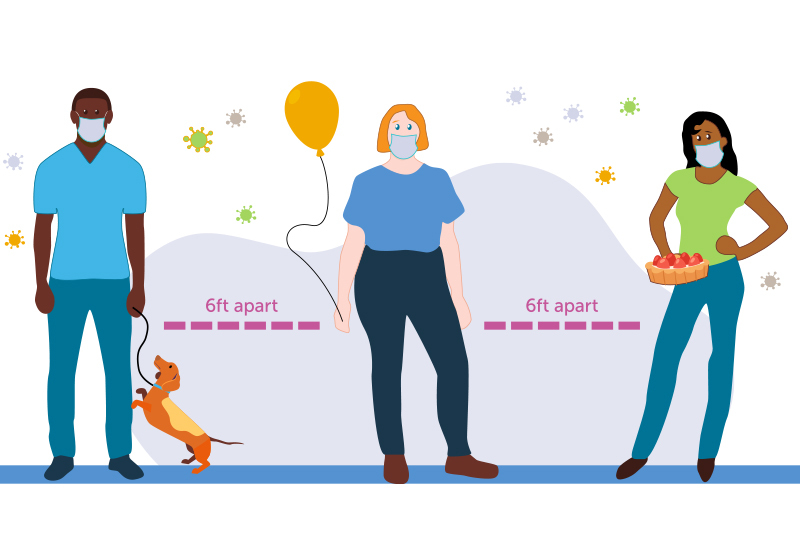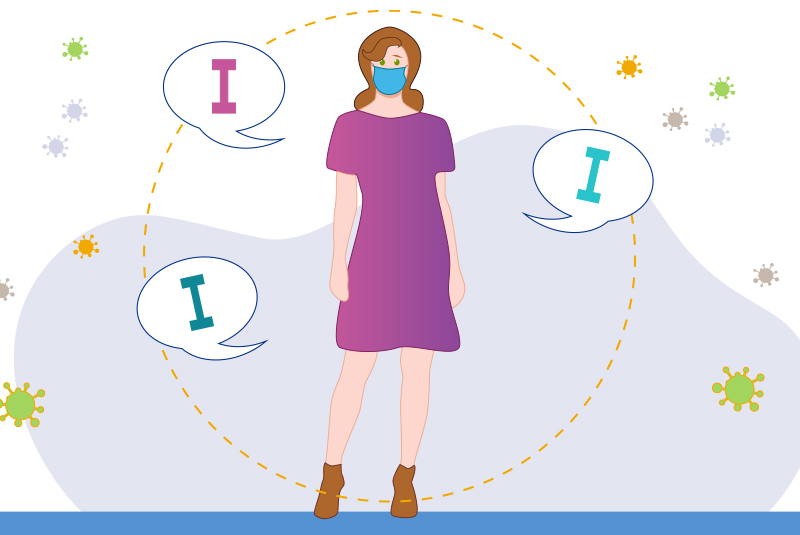Teens and young adults: Is it time for a ‘COVID-19 talk’ with your friends?

You’ve made plans to get together with a few friends to enjoy a physically-distant bonfire at a local beach. You’ve brought your mask, hand sanitizer, and your own big bottle of sparkling water. But when you show up, none of your friends are wearing masks, they keep moving their chairs closer to the fire — and each other — and one even helps herself to your water. You don’t say anything, but leave feeling anxious and upset.
Dating can be a challenge in normal times, but coronavirus adds another layer of anxiety. While you should still follow the same guidelines you would getting together with friends, there are some special considerations for dating.
“If you choose to date, my biggest advice is don’t make assumptions,” says Boskey. “You may think that if you’re going on a date with someone new that they won’t have any symptoms or will have quarantined for 14 days, but that may not be the case. So if there are issues that are important to you, talk about them in advance.”
You may also need to be more upfront than usual about what you expect from the date. “That may include saying, ‘We’re definitely going to kiss tonight, or we’re definitely not going to be kissing,’” says Boskey.
She says you should also consider your date’s living arrangements. “From an infectious disease perspective, their whole household could be going on date with you, too. So if they live with roommates, you may want to find out more about their potential risks.”
If this situation sounds familiar, you’re not alone. As people around the country begin planning social events again, many are finding that their expectations for getting together is different than their friends’.
Elizabeth Boskey, a researcher and social worker at the Center for Gender Surgery at Boston Children’s Hospital likens the experience of talking about COVID-19 to talking about safe sex.
“We have this cultural narrative that being infected with a disease or to be at risk of being infected means that there’s something wrong with you as a person,” says Boskey. “The narrative is that good people don’t have to worry about this. And the other parallel to safe sex is that you can pass the virus to others when you don’t have symptoms. This means you have to actively think about your behavior and how it affects other people.”
If you’re thinking about getting together in a small group — or even one-on-one with a friend, consider having a “COVID-19 talk” before you get together. Below, Boskey offers some tips on how to do this successfully.

Understand your boundaries
Boskey says one of the most important things you can do is to think about your boundaries and what’s important to you before you meet up with friends. “What’s often paralyzing for people is that they get into situation and they feel uncomfortable, but they can’t necessarily articulate why they feel uncomfortable or what they want to do,” says Boskey. “By figuring out your boundaries before the situation happens, it’s easier to enforce them.”
For example, if you know you’re not comfortable being around people not wearing masks, even if you’re outside and 6 feet apart, you may want to think about that and plan what you’re going to do if that situation happens. Boskey says it’s a lot easier to enact a plan when you know ahead of time what you’re going to do.

Set ground rules
“If you’re planning on hanging out with a group of people, talk about the guidelines in advance,” says Boskey. “Will you wear masks or not? Will you stay 6 feet apart? Then you should all agree to those ground rules.”
Boskey says it’s important to realize that people have different risk tolerance, and that’s okay. “You don’t all have to need the same precautions,” she says. You just need to know what you you’re comfortable with and make decisions based on that.”
By talking about ground rules in advance and making it a group decision, it becomes the responsibility of the whole group to keep to that agreement and not about one person or another. “It also gives people a chance to object before the situation and before emotions run high. And if someone is not comfortable with the situation, it gives them the option to opt out.”

Use ‘I’ language
When talking about risk and behavior around coronavirus , Boskey says it’s especially important to use “I” language, not “you” language. “You want to keep it about yourself and your own feelings,” says Boskey. “When people hear ‘you’ language, they shut down. But when you make it about yourself, it’s easier to for others to hear, because you’re explaining your own experience, not interpreting the actions of others.”
So instead of saying “you’re doing it wrong,” or “you should be wearing a mask,” say “I feel uncomfortable being around people who aren’t wearing masks.”
Try to minimize everyone’s risk
Boskey says it’s also important to remember that if you’re getting together with others, it’s probably because they are people you like and care about. “One of the ways we show that we care about people right now includes thinking about minimizing their risk of coronavirus,” she says. “We need to think about our actions in different way now. If we give someone a cold, it might be an inconvenience for a few days, but this is more serious and the outcomes could be grave, so it’s more important to take this seriously.”
Get more answers about Boston Children’s response to COVID-19.
Related Posts :
-

Model enables study of age-specific responses to COVID mRNA vaccines in a dish
mRNA vaccines clearly saved lives during the COVID-19 pandemic, but several studies suggest that older people had a somewhat reduced ...
-

New insight into the effects of PPIs in children
Proton-pump inhibitors (PPIs) are frequently prescribed to suppress stomach acid in patients with gastroesophageal reflux disease (GERD). Prescribing rates of ...
-

Creating the next generation of mRNA vaccines
During the COVID-19 pandemic, mRNA vaccines came to the rescue, developed in record time and saving lives worldwide. Researchers in ...
-

Reversing the trend: Easing the mental health boarding crisis in emergency rooms
Anxiety, depression, and suicide attempts have been rising over the past decade, especially among teens, often landing them in emergency ...





